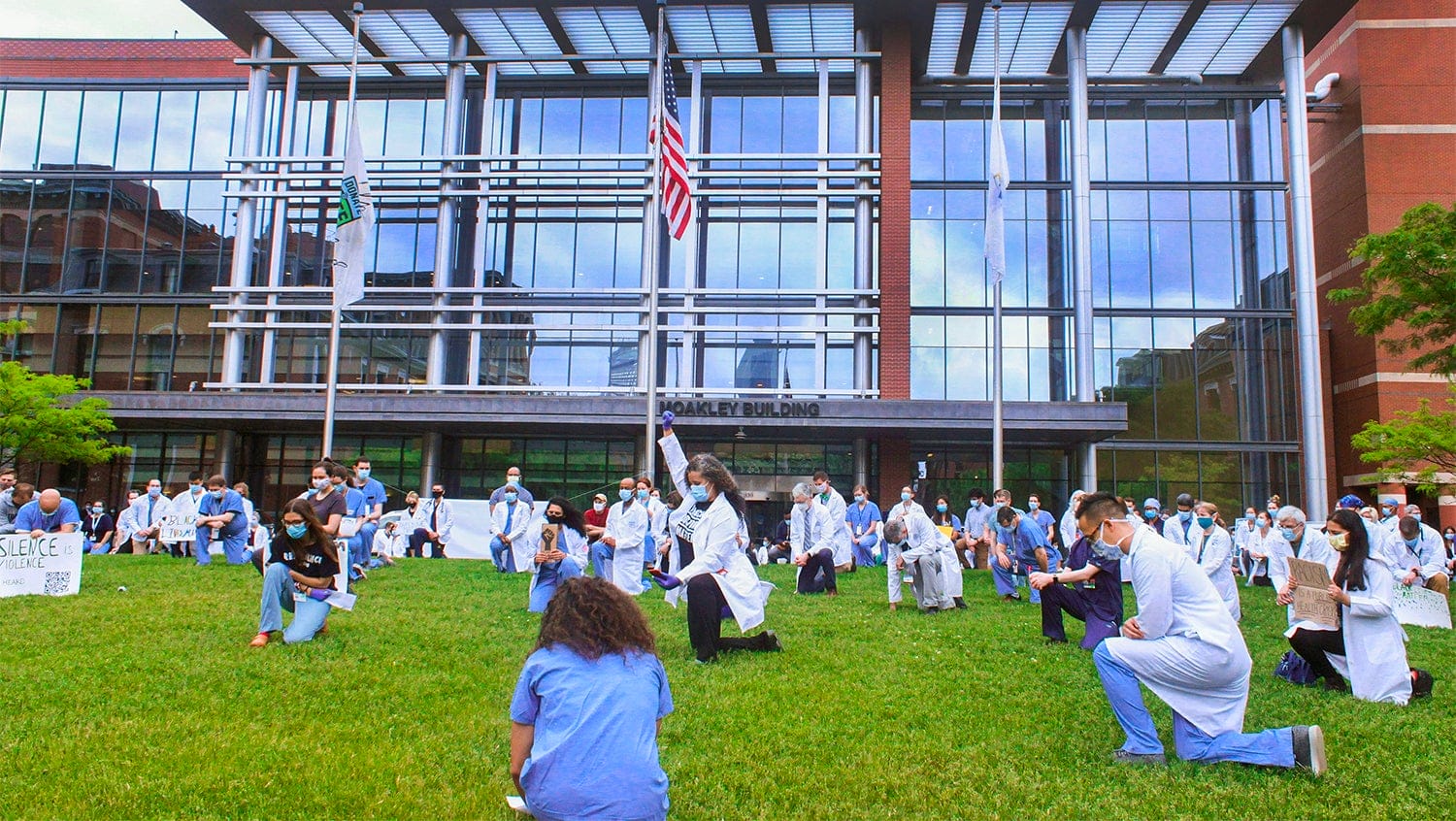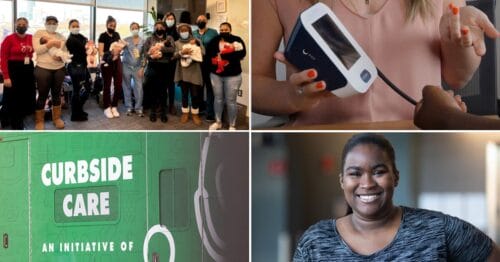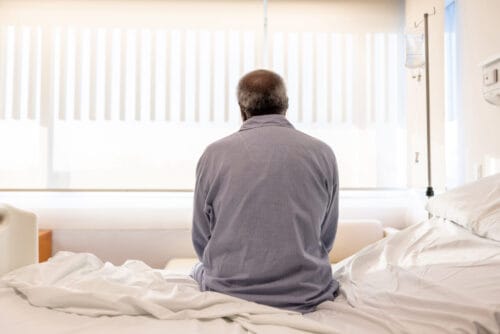
Jazmin Holdway
Physicians call for renewed energy in dismantling systems of oppression for the health and safety of patients, providers, and communities.
On Friday, June 5, healthcare workers across the country participated in the White Coats for Black Lives movement. It’s the latest in a string of demonstrations, symposiums, and protests sparked by the recent death of George Floyd at the hands of the police. The public outcry for justice, not just for Floyd but for countless others who have suffered violence and sanctioned disempowerment in a long history of systemic racism, has caused many to reflect on how they must create equitable and lasting change.
As the United States’ healthcare system is arguably among its most flawed institutions, it’s heartening that hospitals have stood up to share their new or fortified commitments to antiracist practices, policies, and cultures. The president and CEO of Boston Medical Center, for example, which is the largest safety net institution in New England serving disproportionate rates of underserved racial and ethnic minorities, issued a statement on Monday, June 1.
At BMC, we are committed to addressing the effects of racial inequity on our community and being part of the collaborative efforts to create systems for racial equity today and in the future. https://t.co/SZZqKoGgmY pic.twitter.com/gaGdJOz3T8
— BostonMedicalCenter (@The_BMC) June 2, 2020
“We would not be able to live our mission without having committed to understanding, engaging, and working to stop both the highly publicized tragedies and the day-to-day injustices. This has and always will be central to the work at BMC,” says Walsh’s note.
HealthCity followed up with some of the hospital’s physicians who also took to Twitter about the importance of sharing their message. Their responses cover everything from the impact of income and other social determinants of health on racial inequities to the need to sustain each other, hold each other accountable, and collaborate across sectors to dismantle systemic racism. The overall stance that health and social justice are enmeshed was clear. As Walsh said in a later message, “health equity starts with racial equity.” Here’s what they had to say.
People in power need to make it clear where they stand when it comes to injustice. They need to provide support & resources to URM residents.
Your Black resident is part of a Black community (friends, family & acquaintances). No way can we leave our blackness outside the room. https://t.co/g3j4QeGe5I
— Jonas Attilus, MD MPH (@jonasattilus) June 1, 2020
“Being antiracist is an ongoing process, so we have to educate ourselves and hold each other accountable. As physicians, we need to address our bias and prejudice and question our privilege. We need to question the medical curriculum and prepare physicians to be antiracist. Don’t send a syllabus with only white scholars to your students. Ask for minority representation, especially Black women, on your conference panel. Because racism provides unequal access to resources and power, many Black physician researchers have a hard time getting funded. Therefore, it is especially important for people who call themselves allies to invite more minorities to join the decision-making process, with full support behind their voices, especially as research and programs initiated by Black scholars will go a long way to help this cause.” – Jonas Attilus, MD, MPH
Read more from Attilus: The Physician’s Role in Racial Equity »
Describing these disparities is not enough. We need to fix them.
— Asaf Maoz (@asaf_maoz) May 28, 2020
“Even in a safety net hospital like ours, with resources and a clear mission to provide equitable care, we found that utilization of standard therapy can be lower for Black patients. We think this is due to social determinants of health, which need to be addressed much before patients become patients. Racial disparities and racism continue to drive many of these health disparities, and we have to work together with our communities to end them.” – Asaf Moaz, MD
I didn’t hear them name a single Black woman who lost their life to police brutality. #verzuz Intersectionality is a thing. Black Women exist.
— Jasmyne Jackson, MD MBA (@_DrJ) May 31, 2020
“#Verzuz is an battle that occurs on Instagram live between two Black music icons who were popular during the same era. It was created during the COVID19 pandemic as a therapeutic event to help people feel connected and take us on a journey through music’s legendary moments. On May 31st, Kirk Franklin and Fred Hammond read the names of victims of police brutality during their episode. The first list they read were all men. My tweet comments on the need for intersectionality when calling for antiracism, as Black women and Black LGTBQ-identifying folk are too often pushed to the margins of the conversation or forgotten. The artists later apologized and read the names of Black women. As a Queer, Black woman, I advocate for using an intersectional lens to advance racial equity. If we can use genomics to advance precision medicine then we can look at more than one identity simultaneous to address the needs of our patients.” – Jasmyne Jackson, MD, MBA
White people must use our money (aka our #privilege) to support transformational black leaders. I donated to 3 brilliant black women’s work & would encourage you to do the same: @acarrolldesign (@CRXLAB), Leah Penniman (@soulfirefarm), & @DeAndreaforNC #BlackWomenLead #equity
— Lucy Marcil, MD (@DrLucyMarcil) June 3, 2020
“Redistribution of money is not charity, but justice. White people hold the vast majority of money in this country. Of course there are plenty of poor white people in America, but the median white family has a net worth 10 times that of the median Black family. The difference reflects systemic racism — consistent, structural differences in life opportunities between Blacks and whites.
Today, the evidence is clear that not having enough money, however it’s measured (income, debt, wealth, etc.), is associated with poorer physical and mental health outcomes. All of my work as a pediatrician and academic focuses on using economic tools to improve health and wellbeing for families. Of course, much larger action is needed. We need systems to change to truly tackle the Black-white wealth gap and to ensure Black children have the same life and health opportunities white children do. These changes include increasing the minimum wage, ensuring workers have access to paid parental and sick leave, increasing tax credits like the Earned Income Tax Credit and Child Tax Credit, funding baby bonds or child savings accounts as Cory Booker proposed, reparations… the list goes on. But by starting with personal action, I ground myself in the work. I stand in solidarity with my patients and acknowledge I am part of a systematically racist society that is depriving them of economic and health opportunities. And then I get to work to change it.” – Lucy Marcil, MD, MPH
Related: Transforming Pediatrics Through Tax Preparation »
Nobody should be afraid of persecution, torture or violence based on who they are or what they look like. We need to care and put our energy and work and lives and wisdom behind it because #BlackLivesMatter.
— Sarah Kimball (@SKimballMD) June 1, 2020
“In the past week, I’ve had numerous immigrant patients afraid to leave their homes because the murder of George Floyd communicated to them that they aren’t safe, that they are at risk of targeted violence because their skin color. Refugees and asylees come to the U.S fleeing torture and persecution that has been exacted on them by people with power, with the hope that we can offer them a safe possibility of a new life. So many of them are unaware of the painful and violent history of racial injustice in the U.S.
Part of my own journey is that I feel like I can’t look my patients in the eye and tell them that I believe that we have a possibility of building a society that is safer for them unless I am deeply taking part in racial justice advocacy to make that true. Many times in clinic, we are treating patients who have the end-stage physical and emotional symptoms from experiencing violence, racism, inequality and injustice. We have to move from trying to treat the effects of generations of inequality to preventing it, by breaking down the systems of privilege and violence that our society has blindly tolerated.” – Sarah Kimball, MD
Wow. These are our fellows @the_bmc. I know them. They just finished 3 months of front like ID service during F’ing COVID. They can finally rest – just a little. Instead, they volunteered as protest medics. Incredible, inspiring, totally amazing. https://t.co/o6WodLA1oO
— Benjamin P. Linas (@BenjaminLinas) June 3, 2020
“When we lead by example, the benefits are far reaching and often indirect. For example, these fellows are my trainees. Generally, they look up to me for mentorship, advice, and direction. They likely have no idea that their incredible devotion and sincere passion, which is captured in this photo, has sustained me through this very difficult time. There have been multiple occasions when I was feeling overwhelmed by tragedy, work, and exhaustion when the eager efforts of our fellows lifted me off the mat and helped me remember why I care and why I work at BMC. The same is true in every aspect of our lives. When we lead by example, good things happen, and often we never see them.” – Benjamin Linas, MD
Thank you @AmCollSurgeons for your leadership! We sorely need to “stand in solidarity against racism, violence, and intolerance.” @BMCSurgery @BUMedicine @The_BMC #BlackLivesMatter #Peace https://t.co/fYTGg0sZm6
— Jennifer F. Tseng, MD MPH (@TsengJennifer) June 1, 2020
“As we emerge from the COVID peak, we welcome back the return of elective operations and many members of our department. But this is not to be a return to normal, if by “normal” we mean things will or should be exactly the same as before the pandemic, and before the inhumane death of George Floyd at the hands of the Minneapolis Police Department, which has galvanized our nation and our city. Like so many others, I have been horrified by the events of the last week and know I need to do more.
We are perceived to be, and believe ourselves to be, leaders in equity at BMC, but we still have so much more to learn, and more to do. We need to listen to black people, and to other minority or disempowered groups, and learn from what they share of their experiences, without immediate denial, interruption, or arguing to change the narrative to make ourselves feel better.
It goes without saying that there is a lot of work and healing in the broadest sense of the word that needs to be done. We need to stand together in solidarity against racism, violence, and intolerance. We do our best today, but strive to do better tomorrow.” – Jennifer Tseng, MD


